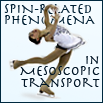Speaker
Daniele Sanvitto
Description
Polaritons are light-matter quasi-particles which are easily
formed in semiconductor microcavities under strong coupling
between cavity photons and quantum well excitons. They have
recently shown very surprising phenomena, typical of
Bose-Einstein condensates (BEC), despite their intrinsic
dissipative nature. Some of these phenomena have paved the
way for the study of new properties which are unique for
such a system formed by non-equilibrium quaiparticles.
Indeed polaritons, compared to their atomic-BEC counterpart,
due to their hybrid lightmatter nature, offer strong
advantages, amongst which a much higher temperature of
condensation, the ability to be easily manipulated/observed
and the possibility of straightforwardly integrate with
present semiconductor technology. We will review some of the
fundamental properties of polaritons under condensation
regime [1-4] and we will show how it is possible, by using a
mixture of different spin population, to form, guide and
disrupt polariton quantum fluids running along the plane of
a semiconductor microcavity [5,6]. Finally, by using
controlled fluid dynamics experiment, we will demonstrate
the first building block in the use of polariton condensates
for the possible realisation of the next generation
all-optical devices.
[1] J. Kasprzak, M. Richard, S. Kundermann, et al., Nature 443, 409 (2006).
[2] E. Del Valle, D. Sanvitto, F. P. Laussy et al. Phys. Rev. Lett. 103, 096404 (2009)
[3] A. Amo, D. Sanvitto, F. P. Laussy, et al. Nature 457, 291 (2009).
[4] A. Amo, J. Lefrère, S. Pigeon, et al., Nat. Phys. 5, 805 (2009).
[5] D. Sanvitto, F. M. Marchetti, M. H. Szymanska, et al., Nat. Phys. 6, 527 (2010). [6] D. Sanvitto, S. Pigeon, A. Amo et al. Nat. Phot. 5, 610 (2011).
[1] J. Kasprzak, M. Richard, S. Kundermann, et al., Nature 443, 409 (2006).
[2] E. Del Valle, D. Sanvitto, F. P. Laussy et al. Phys. Rev. Lett. 103, 096404 (2009)
[3] A. Amo, D. Sanvitto, F. P. Laussy, et al. Nature 457, 291 (2009).
[4] A. Amo, J. Lefrère, S. Pigeon, et al., Nat. Phys. 5, 805 (2009).
[5] D. Sanvitto, F. M. Marchetti, M. H. Szymanska, et al., Nat. Phys. 6, 527 (2010). [6] D. Sanvitto, S. Pigeon, A. Amo et al. Nat. Phot. 5, 610 (2011).

